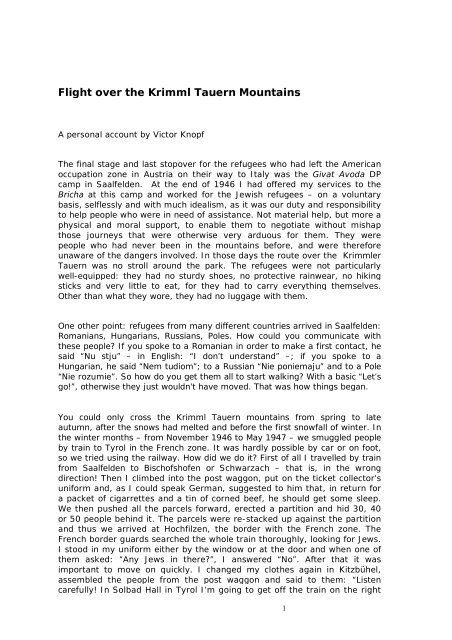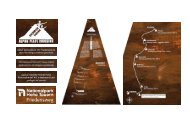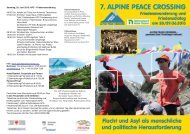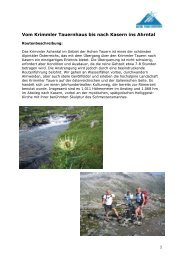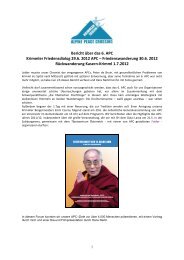Flight over the Krimml Tauern Mountains - Alpine Peace Crossing
Flight over the Krimml Tauern Mountains - Alpine Peace Crossing
Flight over the Krimml Tauern Mountains - Alpine Peace Crossing
Create successful ePaper yourself
Turn your PDF publications into a flip-book with our unique Google optimized e-Paper software.
<strong>Flight</strong> <strong>over</strong> <strong>the</strong> <strong>Krimml</strong> <strong>Tauern</strong> <strong>Mountains</strong><br />
A personal account by Victor Knopf<br />
The final stage and last stop<strong>over</strong> for <strong>the</strong> refugees who had left <strong>the</strong> American<br />
occupation zone in Austria on <strong>the</strong>ir way to Italy was <strong>the</strong> Givat Avoda DP<br />
camp in Saalfelden. At <strong>the</strong> end of 1946 I had offered my services to <strong>the</strong><br />
Bricha at this camp and worked for <strong>the</strong> Jewish refugees – on a voluntary<br />
basis, selflessly and with much idealism, as it was our duty and responsibility<br />
to help people who were in need of assistance. Not material help, but more a<br />
physical and moral support, to enable <strong>the</strong>m to negotiate without mishap<br />
those journeys that were o<strong>the</strong>rwise very arduous for <strong>the</strong>m. They were<br />
people who had never been in <strong>the</strong> mountains before, and were <strong>the</strong>refore<br />
unaware of <strong>the</strong> dangers involved. In those days <strong>the</strong> route <strong>over</strong> <strong>the</strong> <strong>Krimml</strong>er<br />
<strong>Tauern</strong> was no stroll around <strong>the</strong> park. The refugees were not particularly<br />
well-equipped: <strong>the</strong>y had no sturdy shoes, no protective rainwear, no hiking<br />
sticks and very little to eat, for <strong>the</strong>y had to carry everything <strong>the</strong>mselves.<br />
O<strong>the</strong>r than what <strong>the</strong>y wore, <strong>the</strong>y had no luggage with <strong>the</strong>m.<br />
One o<strong>the</strong>r point: refugees from many different countries arrived in Saalfelden:<br />
Romanians, Hungarians, Russians, Poles. How could you communicate with<br />
<strong>the</strong>se people? If you spoke to a Romanian in order to make a first contact, he<br />
said “Nu stju” – in English: “I don’t understand” –; if you spoke to a<br />
Hungarian, he said “Nem tudiom”; to a Russian “Nie poniemaju” and to a Pole<br />
“Nie rozumie”. So how do you get <strong>the</strong>m all to start walking? With a basic “Let’s<br />
go!”, o<strong>the</strong>rwise <strong>the</strong>y just wouldn’t have moved. That was how things began.<br />
You could only cross <strong>the</strong> <strong>Krimml</strong> <strong>Tauern</strong> mountains from spring to late<br />
autumn, after <strong>the</strong> snows had melted and before <strong>the</strong> first snowfall of winter. In<br />
<strong>the</strong> winter months – from November 1946 to May 1947 – we smuggled people<br />
by train to Tyrol in <strong>the</strong> French zone. It was hardly possible by car or on foot,<br />
so we tried using <strong>the</strong> railway. How did we do it? First of all I travelled by train<br />
from Saalfelden to Bischofshofen or Schwarzach – that is, in <strong>the</strong> wrong<br />
direction! Then I climbed into <strong>the</strong> post waggon, put on <strong>the</strong> ticket collector’s<br />
uniform and, as I could speak German, suggested to him that, in return for<br />
a packet of cigarrettes and a tin of corned beef, he should get some sleep.<br />
We <strong>the</strong>n pushed all <strong>the</strong> parcels forward, erected a partition and hid 30, 40<br />
or 50 people behind it. The parcels were re-stacked up against <strong>the</strong> partition<br />
and thus we arrived at Hochfilzen, <strong>the</strong> border with <strong>the</strong> French zone. The<br />
French border guards searched <strong>the</strong> whole train thoroughly, looking for Jews.<br />
I stood in my uniform ei<strong>the</strong>r by <strong>the</strong> window or at <strong>the</strong> door and when one of<br />
<strong>the</strong>m asked: “Any Jews in <strong>the</strong>re?”, I answered “No”. After that it was<br />
important to move on quickly. I changed my clo<strong>the</strong>s again in Kitzbühel,<br />
assembled <strong>the</strong> people from <strong>the</strong> post waggon and said to <strong>the</strong>m: “Listen<br />
carefully! In Solbad Hall in Tyrol I’m going to get off <strong>the</strong> train on <strong>the</strong> right<br />
1
hand side. Watch me through <strong>the</strong> windows and as soon as I get out, you<br />
get out too.” In a flash people would get out of <strong>the</strong> waggons; 20,30,40, as<br />
many as were <strong>the</strong>re. The Bricha’s American trucks – GMCs or Dodges –<br />
stood waiting at Solbad Hall, ready to take us to <strong>the</strong> Gnadenwald camp,<br />
which was <strong>the</strong> Tyrolean “launch pad” into Italy. This was our method of<br />
transporting refugees during <strong>the</strong> winter months until <strong>the</strong> snows melted in<br />
<strong>the</strong> spring of 1947.<br />
Now I come to my favourite route, <strong>the</strong> one I came to love most of all and<br />
which was beautiful but required great physical strength. Normally a few<br />
hundred people would be living at <strong>the</strong> camp in Saalfelden. Each time we<br />
removed 150 or 200 people, our good friend Marko Feingold from<br />
Salzburg sent us ano<strong>the</strong>r 150 so that <strong>the</strong> camp remained full and we<br />
always had enough people to be moved on. We had to segregate <strong>the</strong><br />
refugees, however, according to <strong>the</strong>ir physical capabilities, as <strong>the</strong> route<br />
<strong>over</strong> <strong>the</strong> mountains just didn’t come into question for pregnant women,<br />
invalids or small children. In <strong>the</strong> afternoon, usually between 4 and 5<br />
o’clock, we selected young people who looked particularly suitable and<br />
able, who were to be ready for <strong>the</strong>ir journey by 10 pm. We usually had<br />
four trucks at our disposal. Two of <strong>the</strong>m, one GMC and one Dodge,<br />
belonged to <strong>the</strong> camp; <strong>the</strong> o<strong>the</strong>rs were hired from Geiger in Saalfelden<br />
and Koidl in Mittersill. The drivers arrived in <strong>the</strong> evening, loaded up <strong>the</strong><br />
150 to 200 people and off <strong>the</strong>y went to <strong>Krimml</strong>. Normally everything<br />
went without a hitch.<br />
Only once did we have an accident but <strong>the</strong>re were, thank goodness, no<br />
fatalities. As we drove with fully loaded trucks <strong>over</strong> a bridge in Wald, a<br />
village in Upper Pinzgau, <strong>the</strong> tailgate of one of <strong>the</strong>m, driven by Adolf Pichler,<br />
a future Member of Parliament and Mayor of Saalfelden, fell open. A<br />
Romanian girl called Stella tumbled from a height of around 3 metres into<br />
<strong>the</strong> stream, hitting a rock and breaking her pelvis. She was <strong>the</strong> only one we<br />
ever had to return to Saalfelden. There we had a small DP hospital, run by a<br />
certain Dr Schubert, who was assisted by a nurse called Rosemarie. Stella<br />
lay in plaster for 6 weeks before she could walk again. To avoid any<br />
possibility of fear we did not try to lead her <strong>over</strong> <strong>the</strong> mountains again but<br />
sent her on by train.<br />
Having arrived in <strong>Krimml</strong>, we offloaded <strong>the</strong> people at <strong>the</strong> house<br />
"Fernsebner", this being <strong>the</strong> last house on <strong>the</strong> right-hand side before <strong>the</strong><br />
<strong>Krimml</strong> waterfalls, where <strong>the</strong> first stage of our footslog up to <strong>the</strong> <strong>Krimml</strong><br />
<strong>Tauern</strong> Lodge began. From <strong>the</strong>re, at a height of 1,600 m, our journey<br />
continued to <strong>the</strong> <strong>Krimml</strong> Pass border at 2,600 m, and <strong>the</strong>n down to Kasern in<br />
<strong>the</strong> Aurina Valley on <strong>the</strong> South Tyrol side. There we handed <strong>over</strong> our charges<br />
to our colleagues who were working full-time for <strong>the</strong> Bricha.<br />
How did a typical journey unfold? It all happened at night: we arrived in<br />
<strong>Krimml</strong> at 2 am. Our motto was: disembark quietly and leave no traces<br />
behind, as though no-one had ever been <strong>the</strong>re. The commander of <strong>the</strong> local<br />
Gendarmerie in <strong>Krimml</strong>, Helmut Kraut, knew what was going on. He slept<br />
2
through deliberately; <strong>the</strong> local inhabitants were also sound asleep. Our<br />
groups consisted of 150 to 200 people, some mobile and o<strong>the</strong>rs not so<br />
mobile, accompanied by two Bricha leaders – one led <strong>the</strong> way, while <strong>the</strong><br />
o<strong>the</strong>r brought up <strong>the</strong> rear of <strong>the</strong> procession. As <strong>the</strong> first people were<br />
reaching <strong>the</strong> first waterfall, o<strong>the</strong>rs were still down in <strong>the</strong> valley. To make<br />
sure we did not lose anyone, we always had to wait for <strong>the</strong> slowest to catch<br />
up before advancing fur<strong>the</strong>r. Our responsibilty was, after all, a massive<br />
one. We reached <strong>the</strong> third and uppermost waterfall at around 5 am; some<br />
were already rested while o<strong>the</strong>rs were only just arriving, very weary. From<br />
<strong>the</strong>re <strong>the</strong> path into <strong>the</strong> valley and towards <strong>the</strong> <strong>Krimml</strong> <strong>Tauern</strong> Lodge was<br />
almost straight and almost on <strong>the</strong> level. Eventually we arrived at <strong>the</strong> lodge,<br />
having always had a few minor problems to deal with: someone had<br />
stomachache, somebody else had some o<strong>the</strong>r complaint, but this had to be<br />
taken in our stride. We did not need three hours for <strong>the</strong> walk from <strong>Krimml</strong><br />
to <strong>the</strong> <strong>Tauern</strong> Lodge, but ra<strong>the</strong>r five or six. However, we always arrived<br />
with a complete headcount, and no-one ever went missing.<br />
By about 7 am even <strong>the</strong> stragglers had reached <strong>the</strong> <strong>Krimml</strong> <strong>Tauern</strong> Lodge.<br />
The innkeepers <strong>the</strong>re were very nice and extremely kind to us. We had<br />
brought food with us. Liesl Geisler, <strong>the</strong> innkeeper, who’s son now runs <strong>the</strong><br />
lodge, was in fact like a mo<strong>the</strong>r to <strong>the</strong> children, whenever children – no<br />
babies, but some small children – were with us. She slaved away in <strong>the</strong><br />
kitchen, baking pastries ("Papperl"), making tea and stew for everyone, so<br />
that <strong>the</strong>y had something warm to eat. As <strong>the</strong>re was not enough room<br />
inside, some stretched out on <strong>the</strong> verandah while those most exhausted<br />
rested on mattresses.<br />
We were roused at around 4 pm: “Off to <strong>the</strong> <strong>Krimml</strong> <strong>Tauern</strong> crossing”. This<br />
was yet ano<strong>the</strong>r very arduous footslog, climbing steeply along by a<br />
waterfall on a gravelly path towards <strong>the</strong> end of <strong>the</strong> valley. The route<br />
through <strong>the</strong> Windbach valley up to <strong>the</strong> border took several hours, we got<br />
<strong>the</strong>re as late as 8 or even 9 pm. And <strong>the</strong>n we had only reached <strong>the</strong> border,<br />
on <strong>the</strong> pass <strong>over</strong> <strong>the</strong> main <strong>Tauern</strong> ridge. Ahead of us we still had to<br />
descend to Kasern, which meant ano<strong>the</strong>r three to four hours. The refugees<br />
carried no lamps on this nocturnal march to Kasern. Even we from <strong>the</strong><br />
Bricha had no lights ei<strong>the</strong>r. We would usually arrive in Kasern during <strong>the</strong><br />
night at 1 or 2 am. There, <strong>the</strong> people were accommodated in <strong>the</strong><br />
guesthouse “Kasern” and in a farmhouse which had been rented as a<br />
rehabilitation centre by <strong>the</strong> organisation Joint, effectively <strong>the</strong> Bricha in<br />
Merano. In <strong>the</strong> summer of 1947 <strong>the</strong>re were always 40 “guests” officially<br />
registered <strong>the</strong>re. There were never any problems with <strong>the</strong> local<br />
population, and in fact some good contacts were established. The<br />
inhabitants of <strong>the</strong> Aurina Valley knew that <strong>the</strong> refugees were only ever<br />
planning to stay for a short time. When <strong>the</strong> Bricha was expecting a new<br />
group of refugees, <strong>the</strong> 40 people present at that time were moved on.<br />
And so <strong>the</strong> 40 weakest newcomers could be accommodated in <strong>the</strong> now<br />
empty house. The remainder were transported by <strong>the</strong> Bricha without<br />
fur<strong>the</strong>r delay in American Red Cross vehicles to Merano. If, upon arrival, I<br />
asked <strong>the</strong>m whe<strong>the</strong>r <strong>the</strong>y would go through <strong>the</strong> same ordeal again, <strong>the</strong>y<br />
all replied “No, come what may!”<br />
3
Of course it would not have been possible to cross <strong>the</strong> border without <strong>the</strong> help<br />
and support of both <strong>the</strong> Austrian border guards and Italian carabinieri. Two<br />
Italians helped me on <strong>the</strong> South Tyrol side, who were later to become great<br />
friends of mine. When I met <strong>the</strong>m for <strong>the</strong> first time I stammered to <strong>the</strong>m half<br />
in German and half in Italian, asking <strong>the</strong>m what <strong>the</strong>y wanted for <strong>the</strong>ir help or<br />
whe<strong>the</strong>r I could be of service to <strong>the</strong>m in any way. They asked for cigarette<br />
lighters and tins of sardines, so I stuffed my rucksack full of lighters and<br />
sardines and walked back up to <strong>the</strong> border. The two of <strong>the</strong>m were so grateful<br />
that <strong>the</strong>y helped us in any way <strong>the</strong>y could: humping rucksacks and even<br />
carrying small children all <strong>the</strong> way down to Kasern. These were men who were<br />
sympa<strong>the</strong>tic towards us and ironed out any problems before <strong>the</strong>y could<br />
develop. We also provided Austrian border guards with cigarettes and lighters.<br />
I must recount one single episode that we deliberately provoked. As <strong>the</strong><br />
British found out that Jews were using <strong>the</strong> path to Italy via <strong>the</strong> <strong>Krimml</strong><br />
<strong>Tauern</strong> mountains, <strong>the</strong>y posted guards up on <strong>the</strong> border. The caribinieri<br />
informed <strong>the</strong> Bricha in Merano of this, who in turn told us. So we staged <strong>the</strong><br />
following: we selected 80 lads, really healthy young men, went up to <strong>the</strong> pass<br />
with <strong>the</strong>m and allowed ourselves to be caught, or ra<strong>the</strong>r, allowed ourselves to<br />
be prevented from crossing <strong>the</strong> border. The British were waiting for us and<br />
refused to let us past with a vehement “No, no!”. What should we do? We<br />
simply returned to <strong>the</strong> <strong>Krimml</strong> <strong>Tauern</strong> Lodge and waited for two days. Two<br />
days later <strong>the</strong> British were no longer <strong>the</strong>re. So we <strong>the</strong>n proceeded with 250<br />
people across <strong>the</strong> border, <strong>the</strong>reby hoodwinking <strong>the</strong> British. You could trick <strong>the</strong><br />
French just as easily as <strong>the</strong> British. Thus we took on a constant stream of<br />
people in Saalfelden and handed <strong>the</strong>m <strong>over</strong> in Kasern, in good health and<br />
complete in number, to <strong>the</strong> Bricha from Merano.<br />
Finally, I musn’t forget to give a mention to all those who were particularly<br />
helpful to us during <strong>the</strong> course of this difficult mission. There were not too<br />
many: <strong>the</strong> future Member of Parliament and Mayor of Saalfelden, Adolf<br />
Pichler; Herr Koidl from Mittersill; Herr Josef Gritsch from <strong>the</strong> employment<br />
exchange in Zell am See, who occasionally also helped out as a driver. Herr<br />
Prem, officer at <strong>the</strong> customs post above <strong>the</strong> <strong>Tauern</strong> Lodge, who often<br />
offered me a lift when riding his motorcycle back down to <strong>Krimml</strong>: "Viktor,<br />
d’you know what, climb aboard and I’ll take you down!" was his offer which<br />
I could never refuse, bearing in mind I had to c<strong>over</strong> <strong>the</strong> distance from<br />
<strong>Krimml</strong> to Kasern and back twice each week. I was able to accompany<br />
several thousand refugees safe and sound across <strong>the</strong> mountains, and<br />
that’s something I’m really proud of. The Bricha was disbanded soon after<br />
<strong>the</strong> Declaration of <strong>the</strong> State of Israel on 15th May 1948, as Jews were<br />
henceforth allowed to travel to <strong>the</strong>ir new homeland by fully legal means.<br />
Viktor Knopf was born 1922 in Teschen near Ljublina (Silesia). From<br />
1946 onwards he lived in Pinzgau/Salzburg. He died 1998 in Zell<br />
am See.<br />
The above text is reproduced from <strong>the</strong> book:<br />
Thomas Albrich (Editor), “Flucht nach Eretz Israel. Die Bricha und<br />
der jüdische Exodus durch Österreich nach 1945” (“<strong>Flight</strong> to Eretz<br />
4
Israel. The Bricha and <strong>the</strong> Jewish Exodus through Austria after<br />
1945”). Publ.: Studienverlag Innsbruck-Vienna 1998, Pg. 193 – 198.<br />
5


